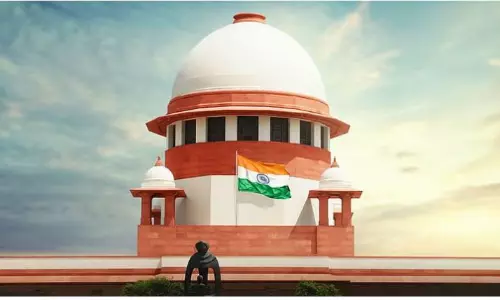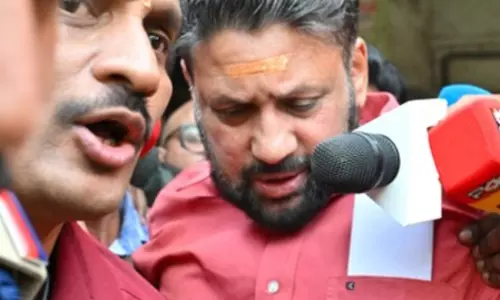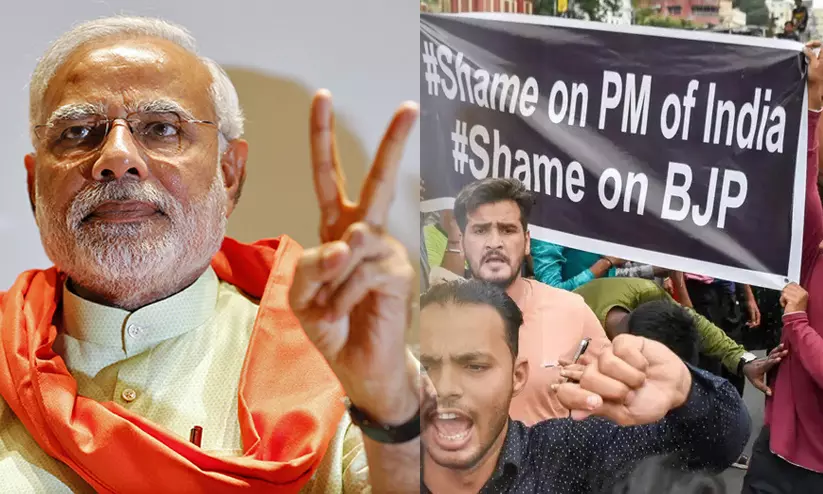
Modi's Muslim hate: Silent EC, crying Oppn for action, and action waiting PM
text_fieldsPrime Minister Narendra Modi targeting of Muslims with a declared aim to create hate against the community, particularly during election time, is not new. However, despite the MCC rule being in effect and the Election Commission's claim of strict action against communal hate, the brazen violation by PM Modi, who referred to Muslims as 'infiltrators,' and the commission's lack of action against the Prime Minister, puts a question mark on the execution of the Constitution.
In a campaign rally held on Sunday in Rajasthan’s Banswada, Prime Minister Narendra Modi drew widespread criticism for his inflammatory rhetoric against India’s Muslim community. Addressing a crowd, Modi insinuated that the Congress, if elected, would prioritize the interests of Muslims over those of other citizens, terming Muslims "infiltrators" who would benefit from government resources at the expense of hardworking individuals.
Modi's remarks centred around a purported statement by his predecessor, Dr Manmohan Singh, alleging that Singh had claimed Muslims should have the "first right" on the country's property.
However, fact-checking organizations quickly debunked Modi's claim, highlighting a statement from Singh's Prime Minister's Office clarifying that his remarks were taken out of context and pertained to equitable development for all marginalized communities, including Muslims.
The Prime Minister's speech not only fuelled tensions but also raised concerns about the Election Commission's silence on such divisive messaging. Despite repeated instances of invoking religious faith, including references to the Ram temple and Lord Ram, the Election Commission remained mum on the matter, prompting criticism from opposition parties and civil society.
The Congress party, in response to Modi's allegations, denied any bias in favour of Muslims in their manifesto. Pawan Khera, Chairman of the Media and Publicity department of the Congress, challenged Modi to provide evidence of such claims, emphasizing that their manifesto prioritized justice for all sections of society, including youth, women, farmers, tribals, and the middle class.
The opposition rally in Jharkhand's Ranchi further echoed concerns over Modi's divisive tactics. Congress President Mallikarjun Kharge condemned Modi's attempts to undermine democracy and constitutional values, accusing him of disenfranchising the poor and disregarding the principles laid down by Babasaheb Ambedkar and Jawaharlal Nehru.
Criticism also extended to Modi's track record, particularly during his tenure as Chief Minister of Gujarat. His history of making inflammatory speeches targeting the Muslim community, dating back to the Gujarat riots of 2002, resurfaced in light of his recent comments. Opposition figures and civil society representatives condemned Modi's divisive rhetoric, labelling it as an attempt to sow seeds of hatred and polarize society for political gain.
As India gears up for elections, the polarization and divisive rhetoric employed by political leaders like Modi are likely to intensify. With the Election Commission facing criticism for its perceived inaction, civil society groups and opposition parties are calling for greater accountability and transparency to ensure a free and fair electoral process.
The Congress has challenged Prime Minister Narendra Modi to provide evidence from their manifesto supporting his claim of redistributing wealth to the Muslim community. Congress President Mallikarjun Kharge labelled Modi's remarks as both hate speech and a deliberate attempt to divert attention from real issues. He accused the RSS and BJP of specializing in lying for political gain.
Former Union Minister and Rajya Sabha MP Kapil Sibal urged the Election Commission of India to take immediate action against Modi for his baseless accusations. Sibal emphasized that PM Modi's speech insinuated that Congress would distribute property to infiltrators and terrorists disregarding the aspirations of the nation's 20 crore people. He criticized the Commission's inaction and demanded condemnation and a notice to Modi.
Rahul Gandhi, another Congress leader, echoed Sibal's sentiments, suggesting that Modi's remarks were a desperate attempt to deflect attention from significant concerns facing the country.
Trinamool Congress Rajya Sabha MP Sagarika Ghosh condemned Modi's comments as a shameless and brazen communal appeal for votes. She criticized the Election Commission for failing to intervene, suggesting that if they continued to neglect such hate speech, the Commission's credibility would be called into question.
Saket Gokhale, another member of the Trinamool Congress, accused Modi of hate speech and criticized the Election Commission for its lack of action.
Asaduddin Owaisi, President of the All India Majlis-e-Ittehadul Muslimeen, highlighted the BJP's history of using anti-Muslim rhetoric for political gain. He criticized Modi's focus on Muslims while ignoring the wealth disparity under his rule, suggesting that the wealthy elite benefited disproportionately from government policies while common Hindus were manipulated into fearing Muslims.






















